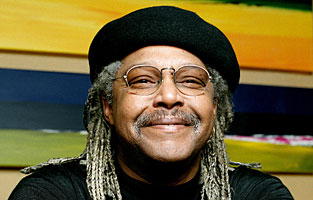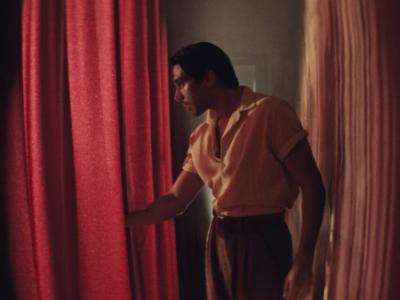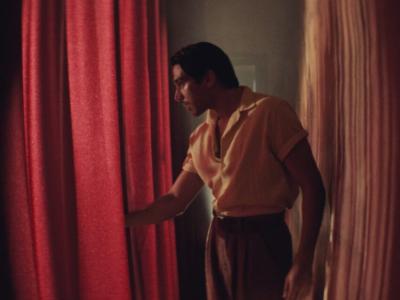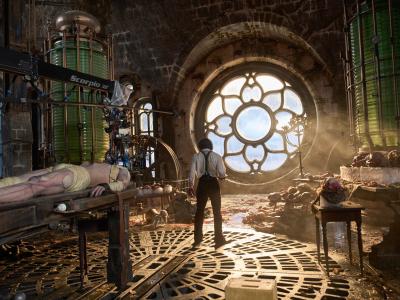Wating for Juan de Marcos to answer the phone, I take a deep breath, hesitating while I try to imagine the personality behind the legend with the short dreads and spectacles. While Ry Cooder gained the glory, it was Juan de Marcos González that instigated and helped realize the original Buena Vista Social Club dream, one of the most successful Latin music projects of all time.
Being the son of Marcos González, a vocalist who performed with legendary Cuban bandleader Arsenio Rodríguez, its not surprising Juan de Marcos had the contacts in the Cuban music world, ready for when Ry Cooder arrived in Havana. He was already working on an "all stars" tribute to the 'golden era' greats of Cuban music, featuring many of the same musicians who were to comprise the Buena Vista Social Club. Subsequently, he led the Afro-Cuban All Stars and Rubén González on their European and American tours, and directed the Buena Vista Social Club original line up concerts in Mexico's Auditorio Nacional, Amsterdam and at Carnegie Hall. Juan de Marcos was simply "the man that made it all happen,” according to Dj Jose Luis, Britain's foremost Latin DJ and music connoiseur.
Growing up in a musical family, Juan de Marcos studied classical guitar at the Conservatory of Havana and then got into rick and pop as a teenager. But his heart was in Cuba’s traditional music. He became the Tres player of Sierra Maestra, a seminal Cuban group, perhaps Cuba’s most important Son group, the first to revive and keet alive the tradition of Cuba’s amazing Son tradition. He went on to study contemporary harmony and orchestral conducting at Goldsmith's College in London and spent a lot of time here, where he met Nick Gold of World Curcuit. The rest is history.
Their project, originally called Afro-Cubism, was to bring musicians from West Africa together with legendary musicians of Cuba’s golden era, but when the Africans couldn’t make it Juan de Marcos and Ry Cooder started the album without them, and so was born the Buena Vista Social Club. The album is often the only Latin album in a collection of indie pop or classical, and the musicians on it, Ibrahim Ferrer, Omara Portuonda, sprung to global fame. Juan de Marcos' dream to keep this amazing Cuban tradition alive became real, and 15 years on he visits us again this April, with the Afro-CUban Allstars, as part of the La Linea line-up.
The immediate impression of Juan de Marcos over the telephone is his openness. For him, themost important thing about the Buena Vista Social Club was it helped many Cubans realize something crucial to their identity. “It was a tribute to Cuban music in the 40s and 50s when Cuban music really came to the fore. Remember that Cuba isn’t like England. The United Kingdom is a very old country with millions of years in its history whereas Cuba is a relatively young country and Cuban nationality really came about in the last century. And so that CD was a tribute to Cuban music back then and was one of the most important projects I did although not the most important. I’d say the most important project was Sierra Maestra. Sierra Maestra was the first group to play traditional music up against the mainstream (or rather the music of the time) and which achieved huge success in the country. Above all in such a competitive country when it comes to music because there are so many good musicians. Sierra Maestra managed to sell its traditional Cuban style in the 70s and 80s and this was really special.”
Sierra Maestra - The project before the project
Sierra Maestra was the first expression of Juan de Marcos’ personal objective to re popularize traditional son. He formed it during his time as an engineering student, teacher and investigator in Moscow. At the time of Ry Cooder’s visit he was working on a 40s/50s tribute album called the Afro Cuban All Stars which already featured several stars of the Buena Vista.
“For me it was an honour by means of both my father and Sierra Maestra to contact musicians of previous generations because in Cuba we really admire the old timers. Of course the fact that I could choose musicians at the level of Ibrahim Ferrer, Rubén Gonzales and Omara Portuondo was a real privilege. Honestly I was so happy to have this opportunity because it isn’t always that a younger person of my age gets to be the director of other musicians who made history before I was even born.”
Contrary to what people may think, there is no Buena Vista Social Club. “What happens is that to earn money, people use the name Buena Vista Social Club to attract the public. When you see it advertised it can’t be Buena Vista Social Club. Not without Compay Segundo or without Ibrahim Ferrer or without Rubén Gonzales. There are several Buena Vista Social Clubs but they are all fake. There is only one which is closest to the original. It’s a band that includes some of the musicians I hired for Afro Cuban All Stars in 1997. None of the musicians in this band are from the original except for one. Manuel Guajiro Mirabal. He’s the only one who recorded the Buena Vista Social Club album with me.”
In any case, that was then. The past has provided Juan de Marcos with the foundations of a Cuban legend having already played a part in bringing back the traditional sounds of Cuba. But what is it he does now that keeps him so relevant?
“I always wanted to build a bridge between modern and contemporary Cuban music because unfortunately modern Cuban music isn’t as well known for political reasons. Before the revolution the top Cuban bands got contracts with big labels in the USA and this made the music better known and it spread internationally. After 1962 when they cut the economic, social and political links between Cuba and the USA our music from then on started becoming less and less recognised and I think we must promote this type of music but at the same time stick to our roots.”
New Expressions of Tradition
Like Buena Vista Social Club, Afro Cuban All Stars are all about traditional Cuban Son, folkloric styles like Guajira and their relevant guitar instruments such as the Tres, not to mention the old stars. “The next CD is going to be called Step Backwards. It’s a tribute to the musicians I’ve had the chance to work with and above all, my father.”
What Juan de Marcos did for them however in their latest record Step Forwards was introduce the traditional 40s sound to the new school Timba, a term that collectivizes Cuban music more closely related to post 70s salsa movement.
“You have to use traditional Cuban elements so that people can identify the art that we create which also enables us to build that bridge between traditional and contemporary music. La música cubana es muy rica.” Juan de Marcos was quick to clarify that it is not so much about mixing styles because Cuban music is rich in many different styles. “All these styles have something in common which are their African roots. Step Backwards is more contemporary and a little jazzier but we are still representing Cuban music, all genres, all styles and all eras.”
Step Backwards, hopefully to be released by the end of the year, includes a DVD featuring some of the best Afro Cuban All Stars concerts from 2011, including Ser Latino music festival in Guanajuato, Mexico.
It seems tours are very popular with the Afro Cuban All Stars. Juan de Marcos highlights their popularity in Australia and New Zealand, Japan and above all the United States. There is no continent in which he has not had tremendous success. It could be that the tour success in the United States is due to the higher level of sangre cubana in certain parts. However, despite the extensive time spent abroad on tours, studying engineering, speaking Russian throughout his youth and taking time out in Mexico for the last couple of years, Juan de Marcos is a resident of his native Cuba. Throughout his career he has returned regularly to Cuba and still lives there today. It is regular for Cuban musicians, artists, performers and athletes to travel extensively beyond their homeland. However, for the majority of citizens it still remains an unlikely dream.
New Generations, new perspectives and new hope
In a sense, Juan de Marcos’s own children's education mirrors his own. His rigorous academic education that took him to the USSR, was combined with a musical education that developed naturally by being around his father, who worked alongside Rubén Gonzalez as well as Arsenio. His daughters, Gliceria and Laura Lydia González Abreu study medicine in Mexico City. The oldest is 27 and the youngest is 25. Aside from their studies they are also full time members of the Afro Cuban All Stars, both delivering vocals, Gliceria on keyboard and Laura Lydia on Bass Clarinet.
Indeed the girls are in touch with popu;ar music and also the classical “The youngest is a clarinettist and her sister is a conductor but they still play Cuban music with me and with the Afro Cuban All Stars and they’re coming on tour in Europe. They are great musicians. They will also be in London in April.”
The remarkable thing about this family, apart from the abundance of musical talent in the blood, is the diversity in their travels. The girls have known more about life in other places than most people from their generation, let alone their generation in Cuba. According to Juan de Marcos, “they have seen different things. They were raised in Cuba and know what it’s all about as well as life outside Cuba. Therefore they know the way of life in other places. For example here in Mexico you see brutal capitalism like in America. It does not resolve issues for people with fewer resources because it does not work well. There is no social security. Some European countries have managed a balance between social measures, measures that favour the poor, and a new free market. Some countries in Europe and like in Scandinavia they base their social security on a tax system which I think is right. Canada has also achieved a balance of high level social security and at the same time the state develops the initiative, potential and competition of the individual.
"In patriarchal systems like the one we have in Cuba, they reduce and practically eliminate the individual’s initiative. Meanwhile for the systems in which capitalism is brutal like here in Mexico or the USA, the levels of social security are very low. This is all really to say that we should try to approach a system with a balance of social security and support of the people with fewer resources or an economy with a market that allows individual initiative and has the production material."
While Juan de Marcos is a strong advocate of moderation, baance, the ying-yang of life and incorporating the best of different worlds, he goes further to offer his fears of the future global hegemony.
"It seems that China is going to have complete control over all capitalist countries. I was reading articles about what China’s doing and honestly China had managed to place the majority of the world’s factories within their own territory. They pay a very low salary and with this low salary they have a very high level of competition. When China breaks this system it will cause an initial disaster within the capitalist system because the current capitalists or rather the owners of these factories and companies are all based in China. If China soon raises the cost of manufacture it will cause a worldwide disaster.”
On the subject of change I saw fit to question Juan de Marcos’ hopes or predictions for the island’s future.
“Well I’m just hoping for a transition period to a more open economy. A gradual but effective one because of course the main thing that affects the individual is the economy of his country so if it’s bad and there’s no suitable production material and everybody suffers. If it improved, the country would open up to a market economy regulated by state entities and so the people with lower income would get better benefits. That’s what I think and I think this will definitely happen. It’s happening right now just too slowly. I think the Cuban government could take quicker steps.”
Tickets for the Afro Cuban All Stars, who perform as part of La Linea Latin Music festival on April 25th at the Barbican are available at: http://www.barbican.org.uk/music/event-detail.asp?ID=12894















